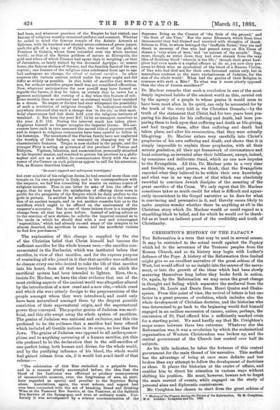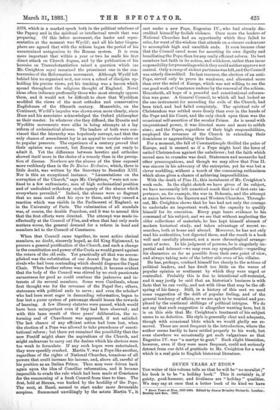CREIGHTON'S HISTORY OF THE PAPACY.* 'his Reformation is a term
that may be used in several senses. It may be restricted to the actual revolt against the Papacy which led to the severance of the Teutonic peoples from the Roman Church, and so its history may begin with Luther's defiance of the Pope. A history of the Reformation thus limited might give us an excellent narrative of the great schism of the West, but would afford us no insight into the causes of the move- ment, or into the growth of the ideas which had been slowly maturing themselves long before they broke forth in action. Or, again, by the Reformation we may mean the great change in thought and feeling which separates the mediaaval from the modern ; St. Louis and Dante from Henri Quatre and Shake- speare. From this point of view, the revival of letters is but one factor in a great process of evolution, which includes also the whole development of Christian doctrine, and the historian who was determined to go back to the beginning would find himself engaged in an endless succession of causes, unless, perhaps, the conversion of St. Paul offered him a sufficiently marked crisis for a starting-point. We need hardly say that Mr. Creighton's scope comes between these two extremes. Whatever else the Reformation was, it was a revolution by which the ecclesiastical organisation of Western Christendom was broken up, and the central government of the Church lost control over half its subjects.
As his title indicates, he takes the fortunes of this central government for the main thread of his narrative. This method has the advantage of being at once more definite and less broken than any attempt to follow the development of doctrines or ideas. It places the historian at the centre of affairs, and enables him to direct his attention in various ways without shifting his position. He must, however, beware not to forget the main current of events, while engaged on the study of personal aims and diplomatic contrivances.
Mr. Creighton has chosen to start from the great schism of
• History of the Papacy during the Period of the Reformation. By M. Creighton, M.A. London : Longman and Co. 1882. 1378, which is a marked epoch both in the political relations of the Papacy and in the spiritual or intellectual revolt that was preparing. Of this latter movement, the leader and repre- sentative at the moment was Wyclif; and all his later biogra- phers are agreed that with the schism began the period of his ,s.nrestrained antagonism to the Roman system. It is even more important that within a year or two he made his first direct attack on Church dogma, and by the publication of his 'heresies on Transubstantiation raised a question which (as Mr. Creighton says) remained the prominent one in the con- troversies of the Reformation movement. Although Wyclif left behind him no organised sect, nor even a school of disciples up- holding his precise views, yet his teaching was a leaven which spread throughout the religions thought of England. Novel ideas often influence profoundly those who most strongly oppose them, and it would not be difficult to show that Wycliflsm modified the views of the most orthodox and conservative Englishmen of the fifteenth century. Meanwhile, on the Continent, Wyclif's impulse was shown even more clearly, since Huss and his associates acknowledged the Oxford philosopher as their master. In whatever else they differed, the Hussite and Wyclifite movements were alike in being attempts at a lay reform of ecclesiastical abuses. The leaders of both were con- vinced that the hierarchy was hopelessly corrupt, and that the only chance of amendment lay in an appeal to secular rulers or to popular pressure. The experience of a century proved that their opinion was correct, but Europe was not yet ready to admit it. Yet the difference between heretics and orthodox showed itself more in the choice of a remedy than in the percep- tion of disease. Nowhere are the abuses of the time exposed more ruthlessly than in the De Buina Ecclesio,e, which, there is little doubt, was written by the Secretary to Benedict XIII. Nor is this an exceptional instance. "Lamentations on the corruption of the Church," says Mr. Creighton, "were not con- fined to a few enthusiasts ; men of high ecclesiastical position and of undoubted orthodoxy spoke openly of the abuses which everywhere prevailed." Indeed, the abuses were so flagrant that no man could shut his eyes to them, and they caused a reaction which was visible in the Parliament of. England, as in the University of Paris. The culmination of all scandals was, of coarse, the doable Popedom, and it was to amend this that the first efforts were directed. The attempt was made in- effectually at the Council of Pisa, and when that had only made matters worse, the general demand for a reform in head and members led to the Council of Constance.
When that Council came together, its most active clerical members, no doubt, sincerely hoped, as did King Sigismund, to procure a general purification of the Church, and such a change in the constitution and power-of the Curia as would guard against the return of the old evils. Yet practically all that was accom- plished was the substitution of one decent Pope for the three rivals who had been contending which should disgrace the Papal Chair. When farther reform was attempted, it became evident that the body of the Council was stirred by no such passionate earnestness for good as could overbear the jealousies and in- terests of its several members. Some were Cardinals, whose first thought was for the revenues of the Papal See; others, statesmen with political ends to serve ; and even the scholars who had been most eager in demanding reformation, began to fear lest a purer system of patronage should lessen the rewards of learning. A few illusory statutes were passed, which would have been unimportant even if they had been observed ; and with this lame result of three years' deliberation, the re- forming zeal of Churchmen was appeased, if not satisfied. The last chance of any efficient action had been lost, when the election of a Pope was allowed to take precedence a consti- tutional reform ; but there yet remained the possibility that the new Pontiff might share the aspirations of the Church, and might endeavour to carry out the desires which his electors were too weak to formulate.. If any such hopes were entertained, they were speedily crashed. Martin V. was a Pope like another, regardless of the rights of National Churches, tenacious of all powers that could increase his income, and, above all, careful of his position as an Italian Prince. Thus men were driven back again upon the idea of Conciliar reformation, and it became impossible to evade the rule which had been made at Constance far the summoning of a fresh Council from time to time. The first, held at Sienna, was barked by the hostility of the Pope. The next, at Basel, seemed to start under more favourable auspices. Summoned unwillingly by the astute Martin V., it met under a new Pope, Eagenins IV., who had already dis- credited himself by foolish violence. Once more the leaders of National Churches had an opportunity which they failed to seize, for want of the wisdom that attends on a sincere endeavour to accomplish high and unselfish ends. It soon became clear that the Council cared more for asserting its own dignity and humiliating the Pope, than for any really efficient reform. Its best members lost faith in its action, and withdrew, rather than incur responsibility for proceedings which they could neither approve nor control. Only a ramp of violent partisans was left, and the Council was utterly discredited. Its last resource, the election of an anti- Pope, served only to prove its weakness, and alienated more than ever the mind of Europe, which was not willing to see the one good work of Constance undone by the renewal of the schism. Henceforth, all hope of a peaceful and constitutional reforma- tion was gone. A General Council, to which all had looked as the one instrument for amending the evils of the Church, had been tried, and had failed completely. The spiritual rule of Christendom was settled more firmly than ever in the hands of the Pope and his Court, and the only check upon them was the occasional self-assertion of the secular Prince. As is usual with unquestioned power, it was directed more and more to selfish aims ; and the Popes, regardless of their high responsibilities, employed the revenues of the Church in extending their dominions or aggrandising their families.
For a moment, the fall of Constantinople thrilled the pulse of Europe, and it seemed as if a Pope might hurl the force of united Christendom against the unbeliever; but the faith which moved men to crusades was dead. Statesmen and monarchs had other preoccupations, and though we may allow that Pins II. was sincere in his advocacy of the enterprise, yet he was but a clever worldling, without a touch of the consuming enthusiasm which alone gives a chance of achieving impossibilities.
With the death of Pius II., this instalment of Mr. Creighton's work ends. In the slight sketch we have given of its subject, we have necessarily left unnoticed mach that is of first-rate im- portance, as, for example, the war in Bohemia, and the attempt at union between the Eastern and Western Churches. Through- out, Mr. Creighton shows that he has had not only the courage to undertake an important work, but the capacity to qualify himself for its execution. Every page bears evidence to his command of his subject, and we see that without neglecting the older collections of materials, he has kept himself abreast of modern historical study, and taken advantage of recent re- searches, both at home and abroad. Moreover, he has not only read his authorities, but digested them, and the result is a book well and carefully planned, not a mere chronological arrange- ment of notes. In his judgment of persons, he is singularly im- partial and tolerant—we may even say sympathetic—regarding his characters as far as possible from their own point of view, and always taking note of the better side even of his villains.
He has, perhaps, confined himself too closelyto the actions of political leaders, and has dwelt too little on the waves of popular opinion or sentiment by which they were urged or controlled. Probably this is due to intentional self-restraint, and it may justly be said that an historian's business is with facts that he can verify, and not with ideas that may be the off- spring of his fancy. Still, in a history of this sort we need some suggestion of the drift of popular feeling, and of the general tendency of affairs, or we are apt to be wearied and per- plexed by the continual shiftings of political intrigue. We do not say that such suggestion is altogether wanting here, but it is on this side that Mr. Creighton's treatment of his subject seems to us defective. His style is generally clear and adequate, though with occasional blots which we would gladly see re- moved. These are most frequent in the introduction, where the author seems hardly to have settled properly to his work, but even elsewhere we occasionally get such vulgarisms as that Engenius IV. was "a martyr to gout." Such slight blemishes,- however, even if they were more frequent, could not seriously detract from our debt of gratitude to Mr. Creighton for a work which is a real gain to English historical literature.



































 Previous page
Previous page